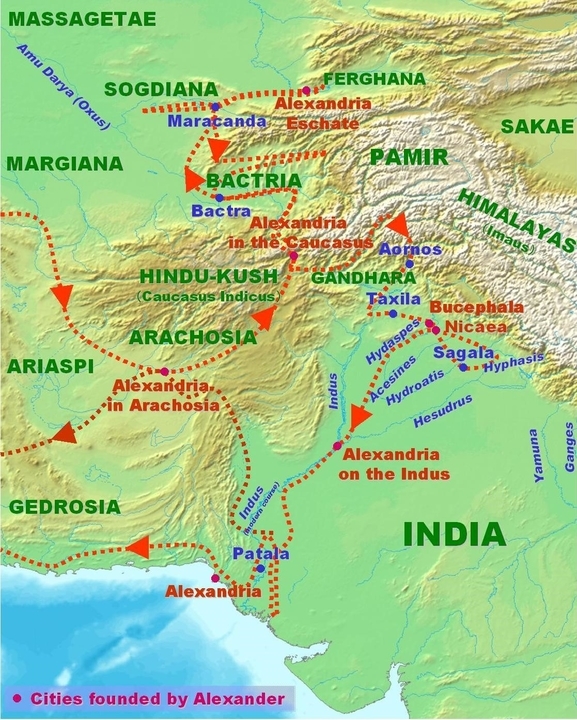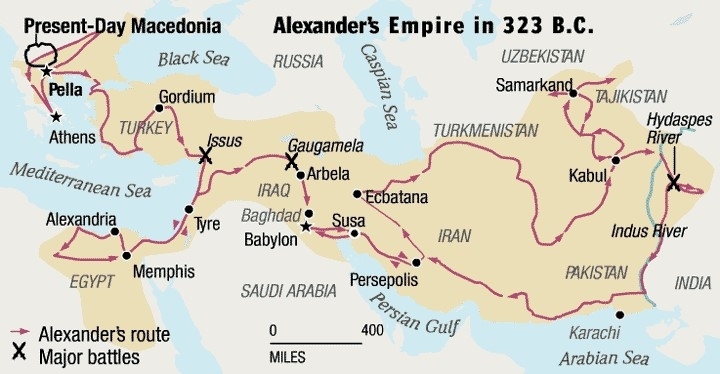Foreign Invasions in India.
North-West India had several small principalities such as Kambojas, Gandharas etc. which fought against each other. The area did not have any powerful kingdom like Magadha which could be easily entered through passes in Hindukush
Iranian Invasion – 518 BC
Iranian rules Darius penetrated into NW India in 516 BC and annexed Punjab, West of Indus and Sindh. This was 20th province of Iran and contributed 1/3rd of the total revenue of Iran due to fertile lands. Xerxes, the successor of Darius, employed a large number of Indians in the war against Greeks.
Results of the contacts
- The impetus to trade and commerce.
- Kharoshthi script came into India
- Iranian influence on Ashokan sculptures is clearly seen
- Iranian invasion eventually led to Alexander’s invasion
प्रखर UPSC EPFO 2020: A 4-Month Master Course (Batch-2)
START FREE TRIAL
Alexander’s Invasion

He defeated the last king of the line of Darius, Xerxes in 333 BC and 331 BC. After occupying the realm of the Persian king, Alexander crossed the Hindukush mountains in eastern Afghanistan in 327 BC.
After annexing Iran, Alexander moved into India through Khyber Pass. Ambhi, the ruler of Taxila readily submitted. He met Porus at Jhelum where he defeated him in the Battle of Hydaphes but later restored his kingdom to him. Alexander marched till the Beas river but his army refused to accompany him. He remained in India from 326-325 B.C after which he was forced to retreat.

Results of the invasion
Direct contact between India and Greek was established through four distinct Land and Sea routes which led to increased trade and commerce.
Cities established: Alexandria in Kabul, Boukephala beside Jhelum, Alexandria in Sindh
Alexanders’ expeditions have given us clearly dated records of his campaign, valuable geographical accounts and information about Indian society and economy
Central Asian contacts and their results
The Indo-Greeks
The series of invasions began in 200 BC by the Bactrian Greeks who were pushed by the Scythian tribes.
- Menander (165-145 BC) was the most famous ruler who was converted to Buddhism by Nagasena. The questions of Menander were compiled as Milindapanho.
- Indo-Greeks were the first to issue Gold coins in India and they were also the first to issue coins which could be definitely attributed to Kings.
- They introduced the features of Hellenistic Art through which Gandhara style had developed.
The Shakas (1st BC – 4th AD)
- The Shakas or Scythians replaced Indo-Greeks. There were five branches of Shakas and they controlled a much larger territory.
- Vikrama Samvat started in 57 BC when a king called as Vikramaditya in Ujjain defeated the Shakas.
- Rudradaman I (AD 130-150) was a famous king who ruled over western India. He repaired the Sudarshana lake in Kathiawar.
The Parthians
- They originally belonged to Iran and they replaced the Shakas in the NW India.
- During the times of Gondophernes, St.Thomas is said to have come to India for the propagation of Christianity.
The Kushans
- They were nomadic people of Central Asia who ruled from the Oxus to the Ganges.
- The Kadaphises I and II ruled for 28 years from 50 AD. They were replaced by the Kanishka.
- Peshawar was their first capital and Mathura the second.
- Kanishka started the Shaka era in 78 AD.
- Kanishka patronized Buddhism by holding a Buddhist council in Kashmir where the doctrines of the Mahayana form of Buddhism was finalized.
Impact of the Central Asian Contacts
- Advances in building activities and pottery
- They had a better cavalry
- They identified themselves as an integral part of India
- Satrapy system of Government developed
- They appointed military governors called Strategos
- Mahayana style of Buddhism developed with Gandhara and Mathura schools of Art supporting the Buddhism.

Comments
Post a Comment
Thanks for reading my Blogs or articles